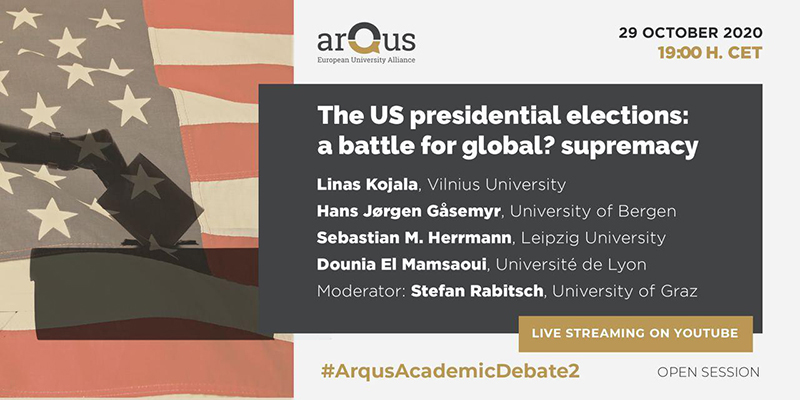“America is fulfilling our destiny as peacemaker, but it is peace through strength. We are stronger now than ever before […], and only when you take care of your own citizens will you find a true basis for cooperation. As president I have rejected the failed approaches of the past and I am proudly putting America first, just as you should be putting your countries first”, said US-President Donald Trump addressing the United Nations General Assembly in September 2020. During the four years of his presidency, Trump has been acting upon one of his signature campaign promises, i.e., distancing the US from the rest of the world by putting “America first”.
Now, with the 2020 race heating up, Democratic presidential nominee Joe Biden and his running mate Kamala Harris challenge the president’s nativist platform, having proclaimed a “battle for the soul of the nation.” While the country seems utterly divided about its national ideological thrust, Europe finds itself in the crossfire of a renewed bi-polar, global power struggle. How should it cope with America’s dwindling role as a global leader? Who will Europe’s allies be if the US cannot or will not fill that position? Will China assume such a position in their own right? How would a second term of the Trump administration likely affect transatlantic relations politically as well as economically?
In the second Arqus Academic Debate, renowned experts working within the European University Alliance tackle these questions from different academic points of view in a live online discussion. Special focus will be laid on two further recurring topics which will without doubt shape the 2020 US presidential elections: The Corona pandemic, on the one hand, as well as the Black Lives Matter movement on the other. During the live debate on the Arqus YouTube channel, which is moderated by Stefan "Steve" Rabitsch (University of Graz/Austria), the following thematic fields will be covered by these researchers:
Economy and Political Science:
Linas Kojala, Institute of International Relations and Political Science, University of Vilnius, will take a look at how transatlantic relations have developed under the Trump administration, cues are: the U.S. role in the regional security and geopolitical crises (Belarus; Ukraine); customs duty on European commodities and America’s exit from the Paris climate agreement as well as from the WHO.
Political Science/Sinology:
Hans Jørgen Gåsemyr, Department of Comparative Politics, University of Bergen, will focus on China’s measured efforts to assume more powerful roles in world politics. Are the Chinese Communist Party leaders expecting more or less challenges with Trump or Biden in the White House?
American Studies:
Sebastian M. Herrmann, Institute for American Studies, University of Leipzig, will discuss the long-standing ties between the US and Europe - one often serving as a projection screen for the other's desires and anxieties. He asks whether some of the talk of a rift between the two is, paradoxically, a form of reaffirming the closeness of their ties.
History:
Dounia El Mamsaoui, Institute of History of Representations and Ideas in the modern era, Université de Lyon, will address the evolution of the American political Discourse and its impact on the concepts of Liberalism and Identity. She sheds more light on the “Trumpian Discourse”, especially in the currently critical situation.
Moderator:
Stefan "Steve" Rabitsch is a postdoctoral researcher in American Studies at the Center for Inter-American Studies at the University of Graz/Austria. He is the author of Star Trek and the British Age of Sail as well as the co-editor of Set Phasers to Teach! Star Trek in Research and Teaching and the forthcoming Routledge Handbook to Star Trek. His professorial thesis project on the cultural history of Western hats received the 2019 Fulbright Visiting Scholar Grant in American Studies and was also awarded the 2020/21 Henry Belin du Pont fellowship by the Hagley Museum and Library.
